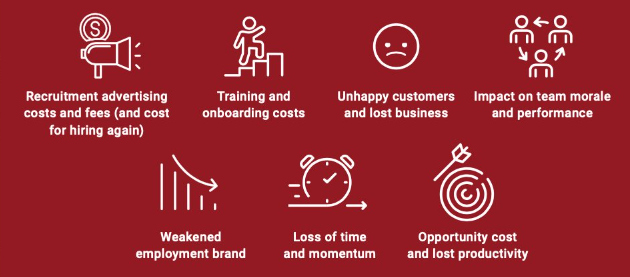The Cost of a Bad Hire
In the increasingly complex environment of a modern business, hiring and retaining talent is more than a routine HR function—it's a critical strategic operation with far-reaching implications for organisational success and sustainability. The direct and indirect costs associated with employee turnover expose a varied picture, revealing a financial burden and a multifaceted challenge impacting productivity, morale, and corporate reputation.

Understanding the True Cost of Employee Turnover
An employee's departure sets off a chain reaction of resource allocation toward finding a replacement. While seemingly straightforward, this process incurs significant costs beyond the financial outlay for advertising and agency fees. The subtler, more deceiving costs manifest in lost productivity as managerial and team resources are diverted to interviewing, onboarding, and training new hires—a process that can span several weeks to months. However, as part of managerial responsibilities, such activities detract from focusing on strategic initiatives that directly contribute to the bottom line.
Research by the Center for Economic and Policy Research and findings from the Society for Human Resource Management (SHRM) highlight the tangible and intangible costs of turnover. These include direct recruitment and training expenses and soft costs like the loss of institutional knowledge, the impact on team dynamics, and the potential erosion of customer satisfaction due to disrupted services. The cumulative effect of these factors underscores the need for a detailed and strategic approach to recruitment.
The Multifaceted Impact of Bad Hires
A bad hire—defined not just by poor performance but also by a lack of alignment with company culture and values—can exacerbate the costs and challenges of employee turnover. The consequences of such a misalignment can ripple through an organisation, from disrupting team harmony to damaging the company's external reputation. As reported by the U.S. Department of Labor, the financial ramifications suggest that a bad hire can cost up to 30% of the employee's first-year earnings, with broader implications for team morale and productivity. However employers cite the costs are much higher, even three to four times the salary higher, with 40% attributed to hard costs and the other 60% to soft costs (such as team morale, loss of knowledge, opportunity costs, burden on team members whilst the role is open again, etc).
Recognising the factors contributing to a bad hire is crucial for refining recruitment processes. These factors include inadequate job descriptions, flawed assessment and selection processes, and failure to integrate new hires into the company culture. Such pitfalls highlight the importance of a comprehensive and strategic approach to recruitment that leverages the expertise of specialised recruitment agencies.
The Strategic Advantage of Specialised Recruitment Agencies
Partnering with specialised recruitment agencies offers a strategic advantage in minimising bad hires. Recruitment agencies provide access to a broader pool of vetted candidates and deep insights into industry trends and candidate expectations. Their expertise can streamline recruitment, ensuring candidates possess the necessary skills and align with the company's culture and values.
This partnership can significantly reduce the likelihood of costly hiring mistakes by implementing advanced candidate assessment methods, including behavioural interviews and practical assessments. Moreover, recruitment agencies can offer guidance on refining job descriptions and requirements to attract suitable candidates, thus enhancing the quality of hires and contributing to organisational success.
A Strategic Imperative for Long-Term Success
The journey to minimise the cost of employee turnover and prevent bad hires is a strategic imperative that requires a nuanced understanding of the recruitment landscape. By recognising the actual costs associated with turnover and leveraging the expertise of specialised recruitment agencies, businesses can adopt a more strategic and practical approach to hiring. This mitigates the financial and cultural risks associated with bad hires and positions the organisation for sustained success and growth. Investing in a specialised recruitment agency partnership is a strategic investment in the organisation's future, ensuring a competitive edge in the ever-evolving business landscape.



